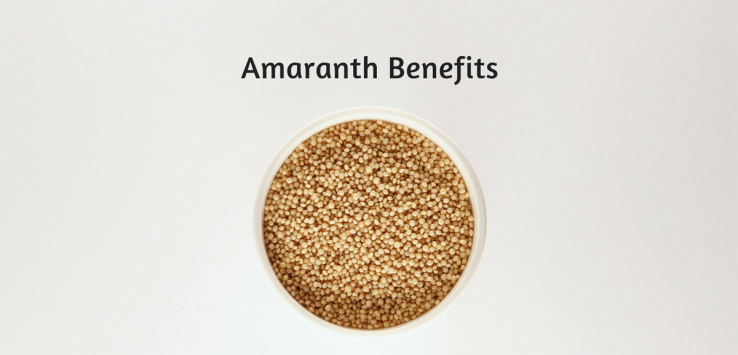- 1Share
- 6 Amaranth Benefits You Must Know About
- 1. It Improves Cardiovascular Health.
- 2. It Helps Healthy Weight Loss.
- 3. It Gives You More Calcium than Milk.
- 4. It Supports Strong Vision.
- 5. It Protects from Sickness.
- 6. It Boosts Digestive Health.
Amaranth, known as ‘ramdana’ in India, is among the oldest cultivated foods in the world. It’s super easy to cook, and is one of the best breakfast options for those with Kapha dosha. These tiny seeds pack a mighty punch – they’re loaded with nutrients like vitamin A, C, B and K, calcium, potassium, iron, and phosphorous. On the other hand, amaranth is completely gluten free. So it’s no surprise there’s a whole bunch of amaranth benefits you can reap.
6 Amaranth Benefits You Must Know About
1. It Improves Cardiovascular Health.
A number of studies confirm that amaranth benefits the cardiovascular system. Its nutrients like fibre, potassium, and vitamin K help maintain balanced blood pressure levels, control inflammation, as well as reduce the levels of LDL (bad) cholesterol. In this way, amaranth is a potent food to include in your diet for protection against a range of heart conditions from high blood pressure to coronary heart disease.
2. It Helps Healthy Weight Loss.
Trying to shed some pounds? Try starting your day with amaranth porridge. This super food reduces Kapha dosha, the dosha associated with having extra weight. It works by reducing your craving to munch during the day. It also causes a drop in insulin levels, helping you burn more fat. On the other hand, it provides you with more protein. Also, being high in fibre, it improves your metabolism and helps you lose weight in a healthy way.
3. It Gives You More Calcium than Milk.
Amaranth has double the amount of calcium as milk! And this mineral isn’t just great for your bones and teeth – you need it for crucial body functions like muscle contraction, nerve impulses, and blood clotting. Being such a rich source of such a vital nutrient, we reckon that amaranth truly deserves a place on your plate. It’s especially valuable for you if your body cannot tolerate lactose, or if you choose to follow a vegan diet. You can also include these other non-dairy calcium rich foods in your diet.
4. It Supports Strong Vision.
There are amaranth leaves benefits for your eyes too – they contain plenty of vitamin A which, as you may know, is vital for healthy vision and protection from early degeneration. They also have vitamin C which fights free radical damage and prevents cataract, supports tissue repair as well as helps maintain cell health.
5. It Protects from Sickness.
Amaranth benefits those who are prone to illness. With its range of vitamins, antioxidants, and minerals (like vitamin A, C, E, magnesium, and iron), amaranth gives your body the nourishment it needs to be immune to disease. It contains a particularly high amount of iron and a fairly good amount of vitamin C – both of which, as you may know, are vital nutrients for immunity. If you find yourself taking sick leaves all too often, you need to include amaranth in your diet; you’re likely to get just the strength boost you need.
6. It Boosts Digestive Health.
The amaranth grain benefits your digestive system a lot, since it has plenty of fibre. This is important to tackle a range of digestive issues like constipation, diarrhoea, and bloating. It helps your body absorb nutrients better, as well as enables you to have more regular bowel movements. It’s a great grain for those who cannot eat gluten since it has none. And it also contains vitamins like A and C that contribute to a better functioning digestive system.






Leave a Reply